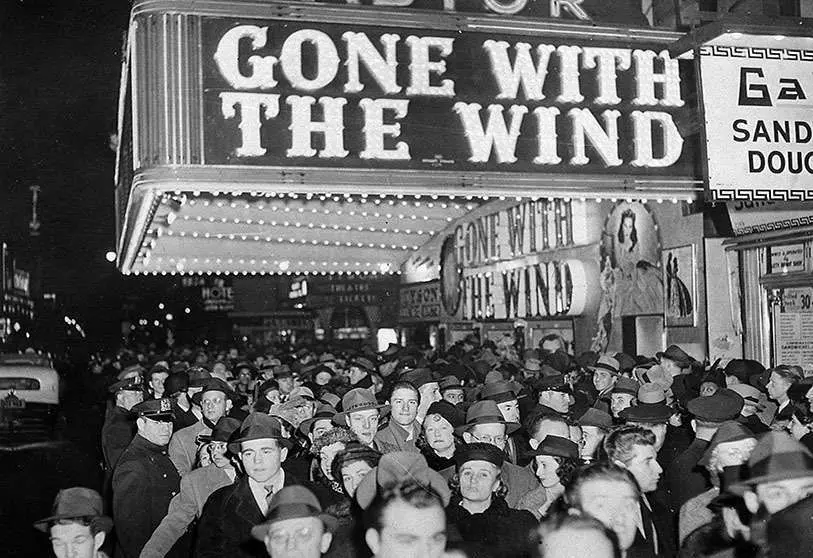Scarlett and Rhett under the magnifying glass of censorship

HBO's initial decision to withdraw the film Gone with the Wind (1939) from its catalogue is a metaphor for the times we live in. It was justified in that this legendary title in film history offers an idealized view of slavery and perpetuates racist stereotypes. The action of the New York-based platform executives comes in the midst of the social storm over the death of African-American citizen George Floyd at the hands of a white police officer on the streets of Minneapolis, and in the midst of worldwide protests against racism sparked by this event. A few hours after it was announced, the decision has been partially corrected by announcing that the super classic will be offered again on its streaming platform, but with a clarifying note at the beginning "that serves to understand and denounce its representation of black people and slavery".
Gone with the Wind was produced by David O. Selznick through Selznick International Pictures Inc. based on the successful novel by writer Margaret Mitchell. It was shot between December 1938 and November of the following year, conducted at different times by Victor Fleming, Sam Wood, and George Cukor, and won eight Academy Awards including Best Film, Director (Fleming), Leading Actress (Vivien Leigh), Supporting Actress (Hattie McDaniel), and Adapted Screenplay. It has become legendary over the generations for its artistic quality and mythical character. Some of its dialogues and sequences are part of the collective memory of film fans and general public.
The diagnosis made by HBO to eliminate it from its catalogue must be fully agreed upon. Not only the film version, but also Margaret Mitchell's novel "offers an idealized view of slavery," because the southern United States in 1864, the place and time in which the story is set, idealized slavery until it was abolished, and even much later. Is it a reason for an artistic work to be censored to be aware of this reality in history? As far as we can see, it is. Racist stereotypes were a way of life in Atlanta in the years before the Civil War, unfortunately for mankind. The current of thought that now seeks to cover up that reality, in order not to be seen because it does not conform to the stereotypes in use today, is another real misfortune, however well it is seen and defended at all times and in all media.
Measuring the content of a 1939 novel and film against the 2020 standards is ridiculous and oozes intolerance. The censorship hordes have already led the way, and only the unwary and disoriented fall into the trap of following their demands. Los Angeles Times critic John Ridley led the way with his article calling for the withdrawal of the film. And the confusion of a media such as HBO has done the rest. Evidence of the vast amount of ground that these ideological commentators have gained in these times of captive thought, and you only need to read it to see it, is the Wikipedia entry for Gone with the Wind, which indoctrinates what Mitchell really means in the most controversial passages of the novel and why these chapters must be fought vigorously.
Disney has also announced censorship on its platform. It is going to erase the film Song of the South from its catalogue, a piece of rubbish without substance that nobody remembers. Neither the title, nor the story, nor its directors, two gentlemen under contract to the entertainment parks production company called Harve Foster and Wilfred Jackson. It's an animated film that hasn't been mentioned for years, and that seems to be a danger to children, as Sleeping Beauty and The Lion King have also been considered in recent times. Paramount Network has just cancelled the broadcast of the dramatized series Cops for preventing police abuse. Not many years ago, the World Health Organization recommended to all governments that Casablanca (1942) be declared unsuitable for children because its protagonists smoked. And many public television channels, at the behest of political parties keen to rewrite history by way of prohibition, vetoed Western films for turning the genocide of the Indian people in their many tribes scattered throughout the United States into a romantic feat.
At the pace of the well-thought out censorship, we will see the demolition of the pyramids of Giza, for having been built by exploiting hundreds of thousands of slaves during decades and glorifying dynastic dictators of the worst condition. And we will also prohibit, if no one remedies it, Shakespeare's Othello because it extols the murder by hanging of Desdemona. Or perhaps not: the Moor of Venice committed suicide shortly afterwards, thus beginning his politically correct purgatory.

